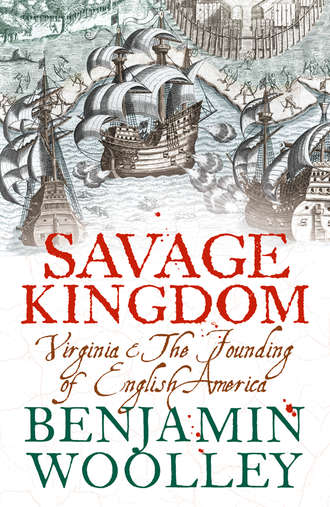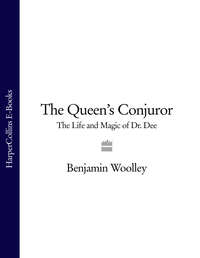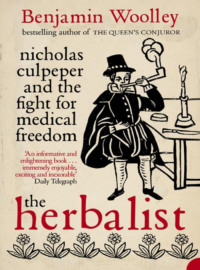
Полная версия
Savage Kingdom: Virginia and The Founding of English America
Smith marched into the fort and immediately ordered the guard to fetch a millstone and two demi-culverins for the Indians to take home. Puzzled at what on the face of it was a violation of the instruction preventing the Indians having access to English arms, they duly produced the items, and Smith was able to amuse himself as the Indians struggled to lift the stone and five tons of cannon. Once they had given up, he ordered that the culverins be charged and loaded with stones. They were fired into a nearby copse of trees ‘loaded with icicles’, and the ‘ice and branches came so tumbling down that the poor savages ran away half dead with fear’.
Smith’s dramatic reappearance provoked a mixed response. ‘Each man with the truest signs of joy they could express welcomed me,’ was Smith’s recollection, ‘except Master Archer and some 2 or 3 of his [friends].’ Archer, exercising his questionable powers as a councillor, called for Smith’s arrest ‘for the lives of Robinson and Emry’, the two men killed by the Indians while accompanying Smith into the upper reaches of the Chickahominy.40
Archer insisted that Smith be tried for the charges ‘upon a chapter in Leviticus’. This curious choice of legal device hints that Smith, who had returned full of excited talk of pagan rites, comely queens and Indian embraces, was suspected of some sexual impropriety with his captors, which provided a pretext for avenging the death of his two companions.41
Whatever the purpose behind the charges, they resulted in Smith being tried the day of his return. He was pronounced guilty, and in sentencing denied even the dignity of a soldier’s death before a firing squad. The rope was once more flung over the tree branch, the ladder once more propped up against the trunk. ‘But it pleased God,’ wrote Wingfield, ‘to send Captain Newport unto us the same evening, to our unspeakable comforts; whose arrival saved Master Smith’s life.’
NINE True Relations
NEWPORT’S ‘GOOD TALL SHIP’ the John & Francis arrived at Jamestown on 2 January 1608. The crossing had taken three months, a stop at Dominica providing a chance to supplement the stores brought from England with a variety of more exotic goods, such as potatoes, bananas and pineapple, plus some parrots, to entertain the settlers, if not to feed them. Though the arrival of so many more mouths to feed must have aroused some apprehension, the belated fulfilment of Newport’s promise to return was met with relief and delight, spoiled only by the news that the consort vessel the Phoenix, under the mastership of Captain Francis Nelson, had gone missing in fog just 30 or so miles from the mouth of the Chesapeake.1
As soon as he was ashore, the admiral set about re-establishing his authority. As well as halting Smith’s execution, he released Wingfield from the pinnace, and stopped Archer calling a ‘parliament’, an assembly of all the settlers, which he may have tried to summon in a final attempt to overthrow Smith. Newport confirmed Smith’s membership of the council, but stripped him of the office of cape merchant, that job being given to one of the new arrivals, John Taverner. Smith no doubt resented the demotion, not least because it weakened his claim to being in charge of relations with the Indians.
Another newcomer, Matthew Scrivener, ‘a very wise, understanding gentleman’, was sworn in as a new councillor. John Martin was put in charge of recovering the correct sample of gold-bearing earth to take back to England. Percy, meanwhile, remained on the sidelines. Despite the council’s lack of numbers, he was still discounted from office.2
Newport also took swift steps to improve the lot of the long-suffering settlers. He commanded his crew to set about building a ‘fair storehouse’ for the bounties brought from England, a ‘stove’ or warm room to provide respite from the cold, and a proper church, no doubt to the delight of the neglected chaplain Hunt.
The relief was short-lived. On 7 January, a fire swept through the fort, which destroyed all but three of the existing buildings, together with the palisades, ammunition, clothes, food supplies and Preacher Hunt’s library of books. One of the new settlers, Francis Perkins, ‘gentleman’, who had arrived with his son, also Francis, ‘labourer’, was distraught to discover that all their possessions had perished, except for a mattress, which had yet to be unloaded from the ship. Meanwhile, President Ratcliffe was badly hurt in a shooting accident, his pistol blowing up as he attempted to fire it. It ‘split his hand’, leaving him with injuries that would take months to heal.3
After such a setback, the settlers needed a distraction from their woes, and Smith readily supplied it, by telling them the extraordinary ‘relation’ of his capture by the Indians, and his meeting with the great Powhatan. It was a story that only he could tell. But it would revive their ‘dead spirits’, he promised, as well as capture imaginations for generations to come.
Captain Smith’s Relation of his being Taken Prisoner by the Indians, how they Conjured Him, Powhatan entertained Him, would have slain him, and how his daughter saved his life
Конец ознакомительного фрагмента.
Текст предоставлен ООО «ЛитРес».
Прочитайте эту книгу целиком, купив полную легальную версию на ЛитРес.
Безопасно оплатить книгу можно банковской картой Visa, MasterCard, Maestro, со счета мобильного телефона, с платежного терминала, в салоне МТС или Связной, через PayPal, WebMoney, Яндекс.Деньги, QIWI Кошелек, бонусными картами или другим удобным Вам способом.




